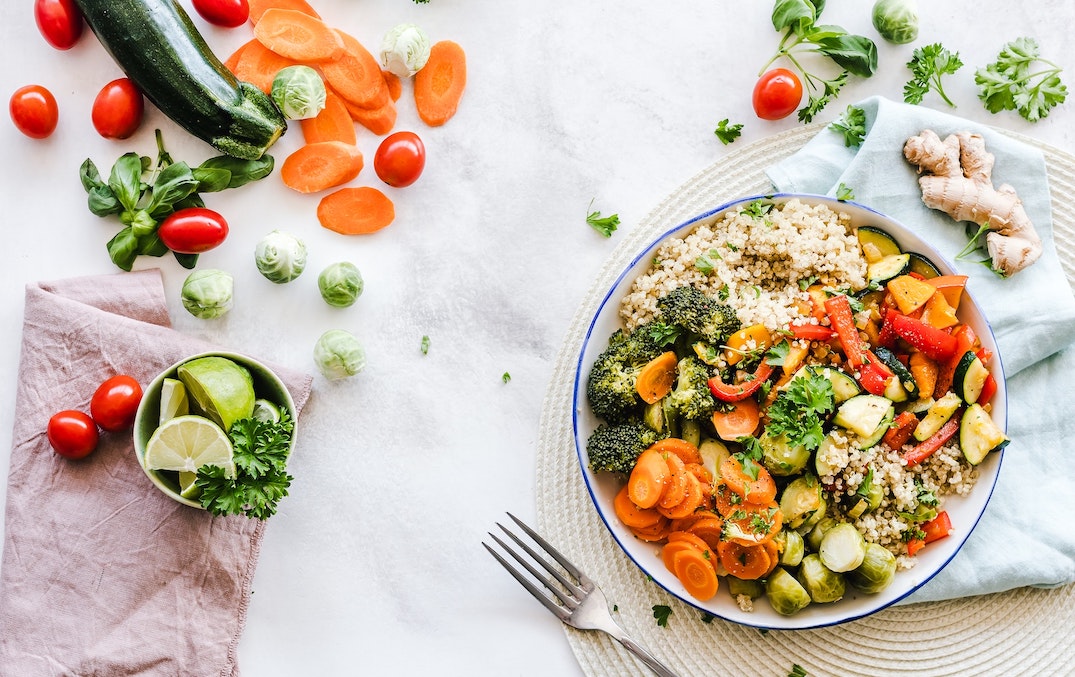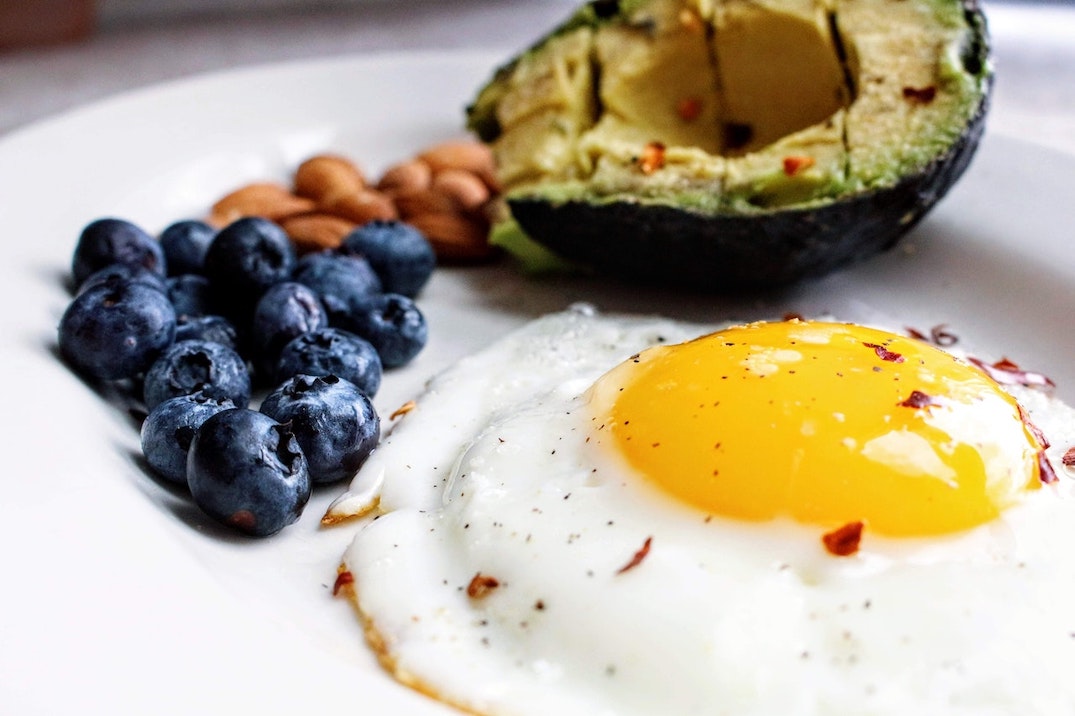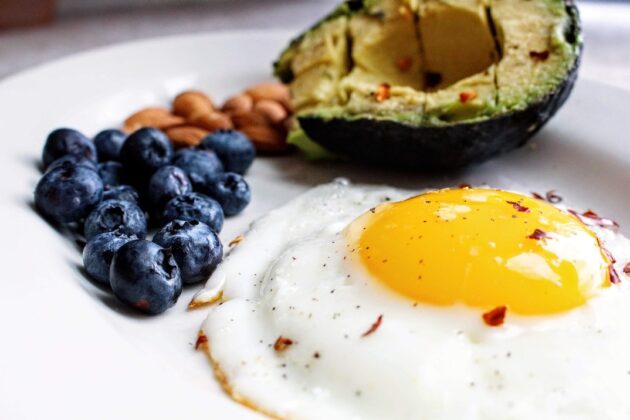PCOS Fertility Diet: Foods That Can Help You Get Pregnant
Polycystic ovary syndrome (PCOS) is a medical condition that can throw off a woman’s menstrual cycle. It is characterized by the overproduction of androgens. Often thought of as male hormones, they are also found in women in small amounts. This means women may not have periods very often, or conversely, they may have periods that last for longer than usual.
In addition to affecting ovulation, PCOS can significantly impact other aspects of reproductive health and overall well-being.
Many women with PCOS find it challenging to conceive, which can be frustrating and cause emotional distress, not to mention stress within relationships. However, there is hope.
Research suggests that adopting a healthy and well-balanced diet can improve fertility outcomes for women with PCOS. It’s also important to avoid foods like refined carbohydrates, sugary beverages, and processed foods that can exacerbate the symptoms of PCOS and hinder fertility.
This guide goes over the ideal PCOS diet to help with fertility, including the best foods to eat and which to avoid. It provides a sample meal plan and other tips for success including how a PCOS nutritionist can help you with fertility issues.
Why PCOS leads to fertility issues
According to the Centers for Disease Control (CDC), up to 12% of women in the U.S. have difficulty getting pregnant because of PCOS.
To get pregnant, a woman’s body needs to ovulate. Ovulation occurs when an egg is released from an ovary, becoming available for fertilization. Female infertility is most often traced to issues with ovulation. Ovulation problems affect approximately 20% of women aged 16 to 44 in the U.S. who struggle to get or stay pregnant.
For women who do not have PCOS, hormones released by the pituitary gland in the brain regulate the ovulation process. These hormones control the growth of an egg and signal the ovary to release it when the time is right. However, in women with PCOS, hormonal imbalances disrupt this delicate system.
Fluctuating hormone levels can hinder the ovary’s ability to develop and discharge a fully mature egg. So, these eggs remain trapped within the ovary, causing small cysts to form. When you combine this with interrupted ovulation, conception becomes more challenging.
The fertility window narrows when you do not ovulate on a regular cycle. In turn, it makes it more difficult for the sperm to meet an egg to fertilize. Not only that, but the hormonal imbalances associated with PCOS impact the uterine lining, making implantation an additional challenge.
Can eating the right foods with PCOS help with getting pregnant?
Numerous studies have shown that diet plays a significant role in improving fertility for women with PCOS. A review of these studies showed that dietary intervention increased clinical pregnancy rates, ovulation and menstrual regularity, and reduced miscarriage rates.
PCOS weight gain and weight centering in the midsection, known as PCOS belly, are a result of insulin resistance and higher than normal levels of male hormones.
The findings from this study show that specific dietary interventions helped to alleviate these problems—meaning changes in your diet can lead to improved fertility, weight loss, and a decrease in PCOS symptoms.

Take Control of PCOS by Partnering With a Dietitian
90% of Zaya Care patients pay $0 for one-on-one counseling with a Registered Dietitan
Foods that can help with fertility with PCOS
While there is no cure for PCOS, you can develop a healthy PCOS diet as a part of your treatment plan.
While the link between diet and fertility is still controversial in some circles, eating as healthy as possible is always a good choice. Regardless of these debates, experts agree that adopting a healthy diet has endless health benefits and is vital to preparing for pregnancy.
Consider incorporating more of these foods into your diet:
- Beans and lentils. These legumes are excellent plant-based protein, fiber, and essential nutrient sources. Beans and lentils are low on the glycemic index, which can help promote better insulin sensitivity.
- Healthy seafood. Choose seafood high in omega-3 fatty acids like salmon, sardines, and trout. Omega-3s are generally associated with improved chances of fertility and can help reduce inflammation in your body.
- Lean meats. Opt for chicken breast, turkey, and lean cuts of beef whenever possible. Avoid meats such as pork belly, beef ribeye, and chicken thighs.
- Olive oil. Incorporate extra virgin olive oil into your cooking routine. Olive oil is an antioxidant and has anti-inflammatory properties. There is even a link between lower risks of cardiovascular disease, some cancers, and dementia in those who consume more olive oil than those who don’t.
- Vegetables. Load up on various colorful vegetables, including leafy greens, broccoli, cauliflower, and bell peppers. These nutrient-packed foods provide antioxidants, vitamins, and minerals that support overall health and hormone balance.
- Whole fruits. Enjoy a wide range of whole fruits, such as berries, citrus fruits, apples, and pears. They are rich in antioxidants, fiber, and natural sugars, offering a healthier alternative to processed sweets.
- Whole grains. Opt for whole grains like quinoa, brown rice, and whole wheat bread instead of refined grains. Whole grains are high in fiber and essential nutrients, promoting stable blood sugar levels.
Intuitive eating can be beneficial if you want a more flexible approach. This means you need to slow down when eating to be aware that your body is telling you you’re full. This can help create a healthier relationship with food so you can make choices that support your overall well-being and fertility goals.
>> Find a PCOS Nutritionist That Accepts Your Insurance
Foods that can reduce fertility with PCOS
While you are prioritizing foods that are nutrient-rich and aid with fertility, you also want to avoid foods that can contribute to insulin resistance, inflammation, and hormonal imbalances. Some of these foods you should avoid or lessen include:
- Processed and refined foods. Highly processed foods, including fast food, packaged snacks, and sugary beverages are high in unhealthy fats, added sugars, and refined grains. These can contribute to inflammation, insulin resistance, and hormonal imbalances.
- High glycemic index carbohydrates. Foods like white bread, white rice, sugary cereals, and baked goods can cause rapid spikes in blood sugar levels. Instead, look for low glycemic index (GI) alternatives like whole grains, fruits, and vegetables, which promote stable blood sugar levels. An easy way to know if the food is low GI is to look out for the GI Symbol on the food packaging.
- Trans fats. Trans fats, commonly found in fried foods, baked goods, and processed snacks, have been linked to increased inflammation and insulin resistance. Avoid foods containing partially hydrogenated oils listed on the ingredient label.
- Excessive caffeine. While moderate caffeine consumption is safe, excessive intake may interfere with fertility. If you want to play it safe, consuming no more than 200 to 300 mg of caffeine daily is recommended, but 100 mg or less is even better.
- Alcohol. High levels of alcohol consumption can disrupt hormone balance and affect fertility. If you’re trying to conceive, abstain altogether if you can. Alcohol use during pregnancy contributes to birth defects and developmental disabilities.
- High mercury seafood. Some fish, such as shark, swordfish, king mackerel, and tilefish, contain high levels of mercury, which can harm fertility and the developing fetus. Choose low-mercury seafood options like salmon, shrimp, and cod.
Avoiding these foods does not mean you have to have a highly restrictive diet. Occasionally treating yourself to a well-deserved indulgence is fine, especially if you have been adding all the healthy foods from the section above that contribute to fertility.
>> Learn More: Can the Keto Diet Help With PCOS?
Other tips that can help with PCOS & fertility
Taking steps to adopt a healthy lifestyle and addressing specific PCOS aspects can further support your fertility efforts. Consider these additional tips:
- Hydrate. Be sure to drink plenty of water each day. Many experts recommend drinking two to three liters daily (eight to 12 cups). Whenever possible, avoid juices, energy drinks, and soda. Be aware, however, that diet sodas may have fewer calories and sugar but correlate with other health problems.
- Eat smaller, more frequent meals. Opt for smaller, balanced meals three times daily with three small snacks evenly spaced out. Doing so can help stabilize blood sugar levels and prevent insulin spikes.
- Limit sodium. Reduce your sodium intake by eliminating (or lessening) foods such as potato chips, salted nuts, canned beans, and canned entrees (like soup). Pay attention to the amount of sodium in pre-packaged meats as well.
- Practice mindful eating. Pay attention to the signs that you are hungry and eat slowly so that you don’t miss indicators from your body that you are full.
- Meal prep. Plan and prepare your meals in advance to ensure you have healthy options. Doing so can help you maintain a healthy eating pattern.
- Consider supplements good for PCOS. Talk to your healthcare provider about supplements that may benefit PCOS weight loss and fertility, such as omega-3 fatty acids, inositol, and vitamin D.
- Get plenty of sleep. Get adequate rest to support hormone regulation and well-being. UNC Fertility suggests getting seven to eight hours of sleep every night. Too few or too many hours can negatively affect fertility.
- Exercise regularly. Regularly exercise to improve insulin sensitivity, manage weight, and boost overall fertility. The CDC recommends 150 minutes of moderate-intensity physical activity and two days of muscle-strengthening activities each week.
- Manage stress. The Mayo Clinic states that while it’s unlikely that stress alone can cause infertility, stress can interfere with your ability to get pregnant. Look for healthy ways to manage your stress. Consider meditation or other relaxation techniques, participating in hobbies you enjoy, or seeking support and assistance from a therapist.
- Work with a PCOS nutritionist. Consider consulting with a registered dietitian or nutritionist specializing in PCOS. Nutritionists can provide you with tailored guidance to help you improve your chances for fertility.

Take Control of PCOS by Partnering With a Dietitian
90% of Zaya Care patients pay $0 for one-on-one counseling with a Registered Dietitan
Example PCOS meal plan to help with fertility
Here’s a sample 1600-calorie meal plan that might support fertility for individuals with PCOS. Note that the best diet for you will depend on your specific needs and intolerances.
Breakfast:
- Oatmeal (1/2 cup dry oats cooked with water) (150 calories)
- Topped with 1 cup fresh blueberries (84 calories) and a sprinkle of cinnamon
- 1 tablespoon chia seeds (70 calories) for added fiber and Omega-3s
Mid-Morning Snack:
- A small apple (52 calories)
- 10 raw almonds (70 calories)
Lunch:
- Lentil Salad:
- 1/2 cup cooked lentils (115 calories)
- Mixed greens (20 calories)
- A mix of colorful veggies like cucumber, bell peppers, and cherry tomatoes (approximately 50 calories)
- Dressing: 1 tablespoon of olive oil (120 calories) with lemon juice
Afternoon Snack:
- 1/2 cup of low-fat Greek yogurt (80 calories)
- Topped with 1 tablespoon of ground flaxseeds (37 calories)
Dinner:
- 4 oz of grilled salmon (low mercury seafood) (236 calories)
- 1 cup of steamed broccoli (55 calories)
- 1/2 cup of cooked brown rice (109 calories)
Evening Snack:
- 1 cup of fresh strawberries (49 calories)
- A handful of raw, unsalted pumpkin seeds (70 calories)
Remember to consult with a healthcare provider or a registered dietitian to ensure your diet meets your specific dietary needs and health goals.
Why you should consider working with a PCOS nutritionist for fertility issues
Seeking the guidance of a PCOS nutritionist or dietitian specializing in women can be highly beneficial, especially if you are struggling with fertility. These specialized professionals possess expertise in tailoring nutritional strategies to manage the unique challenges associated with PCOS.
A PCOS nutritionist understands the delicate relationship between PCOS and insulin resistance. For this reason, they can work with you to create a nutrition plan designed for you, not the masses. Your food plan can help you manage your blood sugar levels, lose weight, and increase your ability to get pregnant.
This tailored approach may involve recommending a balanced diet rich in whole grains, lean proteins, fruits, and vegetables while limiting processed foods, refined carbohydrates, and sugary snacks. Nutritionists can also provide guidance on supplements, such as inositol, omega-3 fatty acids, and vitamin D which have shown promise in PCOS management.
By partnering with a PCOS nutritionist, you can access specialized knowledge and resources that complement other medical interventions for fertility challenges. Your PCOS nutritionist can collaborate with your healthcare providers, including reproductive endocrinologists or gynecologists, to develop a holistic approach to help you navigate PCOS-related fertility concerns.

Take Control of PCOS by Partnering With a Dietitian
90% of Zaya Care patients pay $0 for one-on-one counseling with a Registered Dietitan
Polycystic ovary syndrome (PCOS) is a medical condition that can throw off a woman’s menstrual cycle. It is characterized by the overproduction of androgens. Often thought of as male hormones, they are also found in women in small amounts. This means women may not have periods very often, or conversely, they may have periods that last for longer than usual.
In addition to affecting ovulation, PCOS can significantly impact other aspects of reproductive health and overall well-being.
Many women with PCOS find it challenging to conceive, which can be frustrating and cause emotional distress, not to mention stress within relationships. However, there is hope.
Research suggests that adopting a healthy and well-balanced diet can improve fertility outcomes for women with PCOS. It’s also important to avoid foods like refined carbohydrates, sugary beverages, and processed foods that can exacerbate the symptoms of PCOS and hinder fertility.
This guide goes over the ideal PCOS diet to help with fertility, including the best foods to eat and which to avoid. It provides a sample meal plan and other tips for success including how a PCOS nutritionist can help you with fertility issues.
Why PCOS leads to fertility issues
According to the Centers for Disease Control (CDC), up to 12% of women in the U.S. have difficulty getting pregnant because of PCOS.
To get pregnant, a woman’s body needs to ovulate. Ovulation occurs when an egg is released from an ovary, becoming available for fertilization. Female infertility is most often traced to issues with ovulation. Ovulation problems affect approximately 20% of women aged 16 to 44 in the U.S. who struggle to get or stay pregnant.
For women who do not have PCOS, hormones released by the pituitary gland in the brain regulate the ovulation process. These hormones control the growth of an egg and signal the ovary to release it when the time is right. However, in women with PCOS, hormonal imbalances disrupt this delicate system.
Fluctuating hormone levels can hinder the ovary’s ability to develop and discharge a fully mature egg. So, these eggs remain trapped within the ovary, causing small cysts to form. When you combine this with interrupted ovulation, conception becomes more challenging.
The fertility window narrows when you do not ovulate on a regular cycle. In turn, it makes it more difficult for the sperm to meet an egg to fertilize. Not only that, but the hormonal imbalances associated with PCOS impact the uterine lining, making implantation an additional challenge.
Can eating the right foods with PCOS help with getting pregnant?
Numerous studies have shown that diet plays a significant role in improving fertility for women with PCOS. A review of these studies showed that dietary intervention increased clinical pregnancy rates, ovulation and menstrual regularity, and reduced miscarriage rates.
PCOS weight gain and weight centering in the midsection, known as PCOS belly, are a result of insulin resistance and higher than normal levels of male hormones.
The findings from this study show that specific dietary interventions helped to alleviate these problems—meaning changes in your diet can lead to improved fertility, weight loss, and a decrease in PCOS symptoms.

Take Control of PCOS by Partnering With a Dietitian
90% of Zaya Care patients pay $0 for one-on-one counseling with a Registered Dietitan
Foods that can help with fertility with PCOS
While there is no cure for PCOS, you can develop a healthy PCOS diet as a part of your treatment plan.
While the link between diet and fertility is still controversial in some circles, eating as healthy as possible is always a good choice. Regardless of these debates, experts agree that adopting a healthy diet has endless health benefits and is vital to preparing for pregnancy.
Consider incorporating more of these foods into your diet:
- Beans and lentils. These legumes are excellent plant-based protein, fiber, and essential nutrient sources. Beans and lentils are low on the glycemic index, which can help promote better insulin sensitivity.
- Healthy seafood. Choose seafood high in omega-3 fatty acids like salmon, sardines, and trout. Omega-3s are generally associated with improved chances of fertility and can help reduce inflammation in your body.
- Lean meats. Opt for chicken breast, turkey, and lean cuts of beef whenever possible. Avoid meats such as pork belly, beef ribeye, and chicken thighs.
- Olive oil. Incorporate extra virgin olive oil into your cooking routine. Olive oil is an antioxidant and has anti-inflammatory properties. There is even a link between lower risks of cardiovascular disease, some cancers, and dementia in those who consume more olive oil than those who don’t.
- Vegetables. Load up on various colorful vegetables, including leafy greens, broccoli, cauliflower, and bell peppers. These nutrient-packed foods provide antioxidants, vitamins, and minerals that support overall health and hormone balance.
- Whole fruits. Enjoy a wide range of whole fruits, such as berries, citrus fruits, apples, and pears. They are rich in antioxidants, fiber, and natural sugars, offering a healthier alternative to processed sweets.
- Whole grains. Opt for whole grains like quinoa, brown rice, and whole wheat bread instead of refined grains. Whole grains are high in fiber and essential nutrients, promoting stable blood sugar levels.
Intuitive eating can be beneficial if you want a more flexible approach. This means you need to slow down when eating to be aware that your body is telling you you’re full. This can help create a healthier relationship with food so you can make choices that support your overall well-being and fertility goals.
>> Find a PCOS Nutritionist That Accepts Your Insurance
Foods that can reduce fertility with PCOS
While you are prioritizing foods that are nutrient-rich and aid with fertility, you also want to avoid foods that can contribute to insulin resistance, inflammation, and hormonal imbalances. Some of these foods you should avoid or lessen include:
- Processed and refined foods. Highly processed foods, including fast food, packaged snacks, and sugary beverages are high in unhealthy fats, added sugars, and refined grains. These can contribute to inflammation, insulin resistance, and hormonal imbalances.
- High glycemic index carbohydrates. Foods like white bread, white rice, sugary cereals, and baked goods can cause rapid spikes in blood sugar levels. Instead, look for low glycemic index (GI) alternatives like whole grains, fruits, and vegetables, which promote stable blood sugar levels. An easy way to know if the food is low GI is to look out for the GI Symbol on the food packaging.
- Trans fats. Trans fats, commonly found in fried foods, baked goods, and processed snacks, have been linked to increased inflammation and insulin resistance. Avoid foods containing partially hydrogenated oils listed on the ingredient label.
- Excessive caffeine. While moderate caffeine consumption is safe, excessive intake may interfere with fertility. If you want to play it safe, consuming no more than 200 to 300 mg of caffeine daily is recommended, but 100 mg or less is even better.
- Alcohol. High levels of alcohol consumption can disrupt hormone balance and affect fertility. If you’re trying to conceive, abstain altogether if you can. Alcohol use during pregnancy contributes to birth defects and developmental disabilities.
- High mercury seafood. Some fish, such as shark, swordfish, king mackerel, and tilefish, contain high levels of mercury, which can harm fertility and the developing fetus. Choose low-mercury seafood options like salmon, shrimp, and cod.
Avoiding these foods does not mean you have to have a highly restrictive diet. Occasionally treating yourself to a well-deserved indulgence is fine, especially if you have been adding all the healthy foods from the section above that contribute to fertility.
>> Learn More: Can the Keto Diet Help With PCOS?
Other tips that can help with PCOS & fertility
Taking steps to adopt a healthy lifestyle and addressing specific PCOS aspects can further support your fertility efforts. Consider these additional tips:
- Hydrate. Be sure to drink plenty of water each day. Many experts recommend drinking two to three liters daily (eight to 12 cups). Whenever possible, avoid juices, energy drinks, and soda. Be aware, however, that diet sodas may have fewer calories and sugar but correlate with other health problems.
- Eat smaller, more frequent meals. Opt for smaller, balanced meals three times daily with three small snacks evenly spaced out. Doing so can help stabilize blood sugar levels and prevent insulin spikes.
- Limit sodium. Reduce your sodium intake by eliminating (or lessening) foods such as potato chips, salted nuts, canned beans, and canned entrees (like soup). Pay attention to the amount of sodium in pre-packaged meats as well.
- Practice mindful eating. Pay attention to the signs that you are hungry and eat slowly so that you don’t miss indicators from your body that you are full.
- Meal prep. Plan and prepare your meals in advance to ensure you have healthy options. Doing so can help you maintain a healthy eating pattern.
- Consider supplements good for PCOS. Talk to your healthcare provider about supplements that may benefit PCOS weight loss and fertility, such as omega-3 fatty acids, inositol, and vitamin D.
- Get plenty of sleep. Get adequate rest to support hormone regulation and well-being. UNC Fertility suggests getting seven to eight hours of sleep every night. Too few or too many hours can negatively affect fertility.
- Exercise regularly. Regularly exercise to improve insulin sensitivity, manage weight, and boost overall fertility. The CDC recommends 150 minutes of moderate-intensity physical activity and two days of muscle-strengthening activities each week.
- Manage stress. The Mayo Clinic states that while it’s unlikely that stress alone can cause infertility, stress can interfere with your ability to get pregnant. Look for healthy ways to manage your stress. Consider meditation or other relaxation techniques, participating in hobbies you enjoy, or seeking support and assistance from a therapist.
- Work with a PCOS nutritionist. Consider consulting with a registered dietitian or nutritionist specializing in PCOS. Nutritionists can provide you with tailored guidance to help you improve your chances for fertility.

Take Control of PCOS by Partnering With a Dietitian
90% of Zaya Care patients pay $0 for one-on-one counseling with a Registered Dietitan
Example PCOS meal plan to help with fertility
Here’s a sample 1600-calorie meal plan that might support fertility for individuals with PCOS. Note that the best diet for you will depend on your specific needs and intolerances.
Breakfast:
- Oatmeal (1/2 cup dry oats cooked with water) (150 calories)
- Topped with 1 cup fresh blueberries (84 calories) and a sprinkle of cinnamon
- 1 tablespoon chia seeds (70 calories) for added fiber and Omega-3s
Mid-Morning Snack:
- A small apple (52 calories)
- 10 raw almonds (70 calories)
Lunch:
- Lentil Salad:
- 1/2 cup cooked lentils (115 calories)
- Mixed greens (20 calories)
- A mix of colorful veggies like cucumber, bell peppers, and cherry tomatoes (approximately 50 calories)
- Dressing: 1 tablespoon of olive oil (120 calories) with lemon juice
Afternoon Snack:
- 1/2 cup of low-fat Greek yogurt (80 calories)
- Topped with 1 tablespoon of ground flaxseeds (37 calories)
Dinner:
- 4 oz of grilled salmon (low mercury seafood) (236 calories)
- 1 cup of steamed broccoli (55 calories)
- 1/2 cup of cooked brown rice (109 calories)
Evening Snack:
- 1 cup of fresh strawberries (49 calories)
- A handful of raw, unsalted pumpkin seeds (70 calories)
Remember to consult with a healthcare provider or a registered dietitian to ensure your diet meets your specific dietary needs and health goals.
Why you should consider working with a PCOS nutritionist for fertility issues
Seeking the guidance of a PCOS nutritionist or dietitian specializing in women can be highly beneficial, especially if you are struggling with fertility. These specialized professionals possess expertise in tailoring nutritional strategies to manage the unique challenges associated with PCOS.
A PCOS nutritionist understands the delicate relationship between PCOS and insulin resistance. For this reason, they can work with you to create a nutrition plan designed for you, not the masses. Your food plan can help you manage your blood sugar levels, lose weight, and increase your ability to get pregnant.
This tailored approach may involve recommending a balanced diet rich in whole grains, lean proteins, fruits, and vegetables while limiting processed foods, refined carbohydrates, and sugary snacks. Nutritionists can also provide guidance on supplements, such as inositol, omega-3 fatty acids, and vitamin D which have shown promise in PCOS management.
By partnering with a PCOS nutritionist, you can access specialized knowledge and resources that complement other medical interventions for fertility challenges. Your PCOS nutritionist can collaborate with your healthcare providers, including reproductive endocrinologists or gynecologists, to develop a holistic approach to help you navigate PCOS-related fertility concerns.

Take Control of PCOS by Partnering With a Dietitian
90% of Zaya Care patients pay $0 for one-on-one counseling with a Registered Dietitan
















